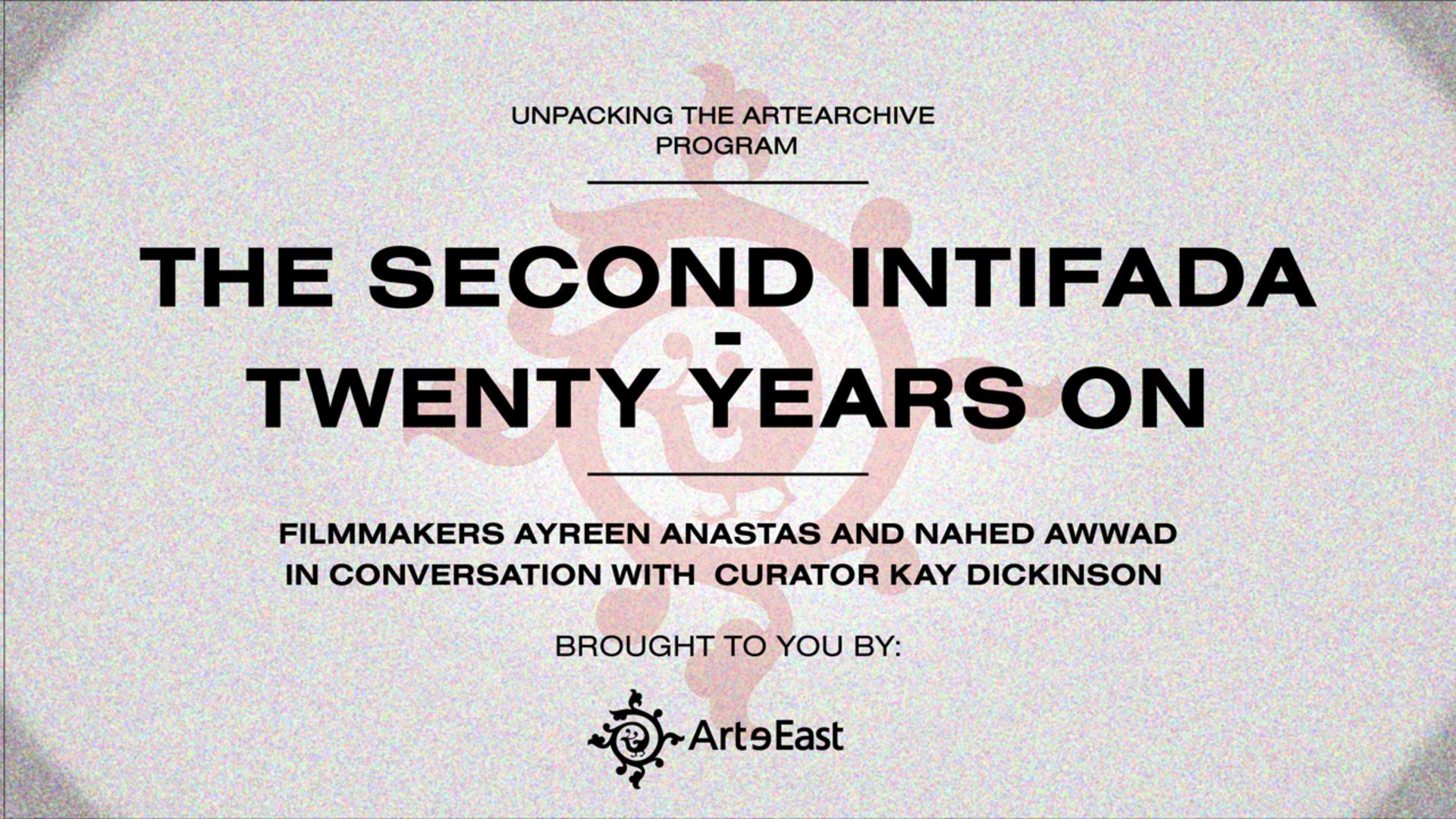
The Second Intifada heralded a particularly fresh, urgent and experimental approach to filmmaking, in tune with the uprisings to which they contributed. Working at a distance from both the main political organizations and, often, the aesthetic insistences of Global Northern art cinema funding, filmmakers took advantage of accessible technologies to forge new notions of freedom. The prolific body of work from this period does not just defiantly catalogue heightened colonial aggressions and appropriations, it does so with a wit and eclecticism of approach that touched diverse audiences at home and internationally.
Featuring works by Ayreen Anastas, Nahed Awwad, Enas I. Al-Muthaffar, Annemarie Jacir, and Larissa Sansour
Curated by Kay Dickinson
Filmmakers Ayreen Anastas and Nahed Awwad in Conversation with curator Kay Dickinson
Ayreen Anastas is an artist born in Bethlehem in Occupied Palestine, attended universities in Birzeit, Berlin, lived in Brooklyn for many years, has been involved since 1999 in “16 Beaver”, an autonomous movement space toward art, politics, and communal thought. She has been artist and agent for dOCUMENTA (13). She is, along with Rene Gabri, the only artist to have represented two countries in the Venice Biennale (Armenia and Denmark) without being a citizen of either. Her most recent film Black Bach Artsakh has premiered in the 2021 Berlinale.
Nahed Awwad is a Palestinian independent filmmaker and a film curator; based in Berlin. She has been working in Film and Television since 1997. She participated in several professional training in Canada, Qatar, and Belgium. In 2004 she got her film diploma from the European film college in Denmark. She released eight documentary films between experimental, short and feature length.
Awwad’s films were screened at various international film festivals, to mention few; HotDocs film festival, Canada 2013, “one world” Human right film festival in Prague, 2013, Vision du Reel Film Festival, Nyon, Switzerland in 2005 and 2008 and the Cannes Film Festival in 2008 (Cinema Sud). In 2009 she was granted the International Trailblazer Tribute -Middle East Trailblazer in MIPDOC.
Kay Dickinson teaches Film and Television Studies at the University of Glasgow. She is the author of Arab Cinema Travels: Transnational Syria, Palestine, Dubai and Beyond (BFI Publishing, 2016) and Arab Film and Video Manifestos: Forty-Five Years of the Moving Image Amid Revolution (Palgrave, 2018). More recently, she co-edited The Arab Archive: Mediated Memories and Digital Flows (Amsterdam: Institute of Network Cultures, 2020) with Donatella Della Ratta and Sune Haugbolle. Over the years, she has contributed in various ways to a number of festivals dedicated to Arab cinema, in the region, as well as in Europe and North America. She is a member of the Regards palestiniens and Regards syriens screening collectives.
The Second Intifada heralded a particularly fresh, urgent and experimental approach to filmmaking, in tune with the uprisings to which they contributed. Working at a distance from both the main political organizations and, often, the aesthetic insistences of Global Northern art cinema funding, filmmakers took advantage of accessible technologies to forge new notions of freedom. The prolific body of work from this period does not just defiantly catalogue heightened colonial aggressions and appropriations, it does so with a wit and eclecticism of approach that touched diverse audiences at home and internationally.
Featuring works by Ayreen Anastas, Nahed Awwad, Enas I. Al-Muthaffar, Annemarie Jacir, and Larissa Sansour
Curated by Kay Dickinson
Filmmakers Ayreen Anastas and Nahed Awwad in Conversation with curator Kay Dickinson
Ayreen Anastas is an artist born in Bethlehem in Occupied Palestine, attended universities in Birzeit, Berlin, lived in Brooklyn for many years, has been involved since 1999 in “16 Beaver”, an autonomous movement space toward art, politics, and communal thought. She has been artist and agent for dOCUMENTA (13). She is, along with Rene Gabri, the only artist to have represented two countries in the Venice Biennale (Armenia and Denmark) without being a citizen of either. Her most recent film Black Bach Artsakh has premiered in the 2021 Berlinale.
Nahed Awwad is a Palestinian independent filmmaker and a film curator; based in Berlin. She has been working in Film and Television since 1997. She participated in several professional training in Canada, Qatar, and Belgium. In 2004 she got her film diploma from the European film college in Denmark. She released eight documentary films between experimental, short and feature length.
Awwad’s films were screened at various international film festivals, to mention few; HotDocs film festival, Canada 2013, “one world” Human right film festival in Prague, 2013, Vision du Reel Film Festival, Nyon, Switzerland in 2005 and 2008 and the Cannes Film Festival in 2008 (Cinema Sud). In 2009 she was granted the International Trailblazer Tribute -Middle East Trailblazer in MIPDOC.
Kay Dickinson teaches Film and Television Studies at the University of Glasgow. She is the author of Arab Cinema Travels: Transnational Syria, Palestine, Dubai and Beyond (BFI Publishing, 2016) and Arab Film and Video Manifestos: Forty-Five Years of the Moving Image Amid Revolution (Palgrave, 2018). More recently, she co-edited The Arab Archive: Mediated Memories and Digital Flows (Amsterdam: Institute of Network Cultures, 2020) with Donatella Della Ratta and Sune Haugbolle. Over the years, she has contributed in various ways to a number of festivals dedicated to Arab cinema, in the region, as well as in Europe and North America. She is a member of the Regards palestiniens and Regards syriens screening collectives.